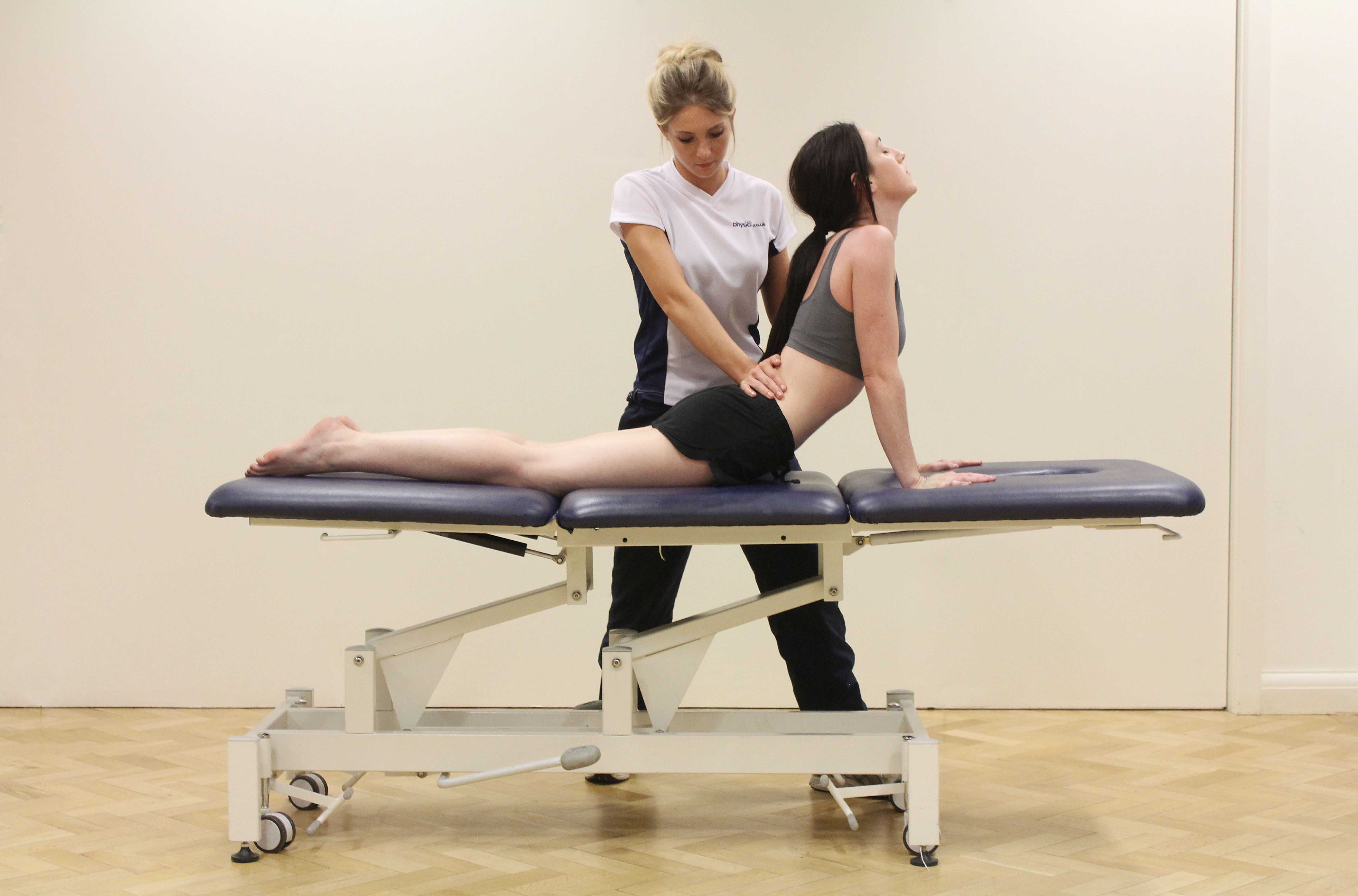There are different classifications of pregnancy related perineal tears depending on the severity of the injury:
First degree: a tear of the perineal skin
Second degree: a tear of the peroneal skin and muscles
Third degree: involves the peroneal skin, muscles and the anal sphincter. This category can be sub-categorised into:
a. less than half of the external sphincteris torn (muscle of the back passage)
b. a complete tear of the external sphincter
c. a tear in the internal sphincter
Fourth degree: a third degree tear and the anal epithelium (layer of tissue covering the anus) is also torn
 Above: Core stability and pelvic floor exercises supervised by a experienced therapist
Above: Core stability and pelvic floor exercises supervised by a experienced therapistWhat causes a pregnancy related perineal tear?
- If forceps are used to increase the space for delivery
- If an episiotomy (surgical incision) is needed to facilitate the delivery
- A large baby (over 9lb)
- Previous perineal tears
- Delivering a first child
What are the benefits of physiotherapy for pregnancy related perineal tears?
Regardless of the type of perineal tear, physiotherapy is a very effective way of reducing the pain and other symptoms that you may be experiencing. Physio.co.uk will work with you to create a comprehensive physiotherapy programme to help you achieve your goals. The benefits of physiotherapy include:
- Pain control
- Minimise the risk of incontinence problems
- Reduce bruising and bleeding
- Reduce swelling
- Strengthening of pelvic floor muscles
- Reduce the risk of futureperineal tears
Conservative (non surgical) treatment for pregnancy relatedperineal tears
For first and second degreeperoneal tears, the healing will naturally occur meaning that surgery is not necessary. However, it is important that you take an active role in your recovery. Physiotherapy is an effective way of strengthening your pelvic floor muscles and minimising the risk of re-injury. The physiotherapists at Physio.co.uk can devise an individualised programme to help you with your recovery which may include:
- Pain control modalities
- Pelvic floor strengthening exercises
- Cyrotherapy (ice) treatment to reduce swelling
- Electrotherapy including Megapulse/ Pulse short wave diathermy
- Moving and handling techniques
- Strengthening exercises of transverse abdominismuscle
- Advice on positioning
- Gentle massage
Surgical treatment for pregnancy related perineal tears
For third and fourth degree perinealtears, your wound will be repaired using dissolvable stitches which do not have to be removed. The stitches should dissolve after six weeks and most women do not experience any problems after this. The operation will be performed under general anaesthetic or using an epidural (spinal) anaesthetic meaning that you will not feel anything during the surgery. It is important that you continue with your physiotherapy programme created by Physio.co.uk to reduce the risk of any long term complications.
Physiotherapy before perineal repair surgery
It is important to begin a simple physiotherapy programme designed by Physio.co.uk to optimise the success of your operation. Physiotherapy at this stage may include:
- Electrotherapy including Megapulse/ Pulse short wave diathermy
- Pelvic floor strengthening exercises
- Cyrotherapy (ice) treatment
- Preparation and advice for after your operation
Symptoms following perinealrepair surgery
There are certain temporary symptoms that you may experience following the operation. Your physiotherapist at Physio.co.uk can help you manage these to reduce any pain or discomfort. Potential symptoms include:
Physiotherapy following perineal repair surgery
Your comprehensive physiotherapy programme designed by Physio.co.uk will begin shortly after your operation. There are a variety of treatment options available to you and these will depend on the rate of your recovery.
Week 1
During the first week, your physiotherapy programme will concentrate on controlling your pain and reducing any symptoms you may be experiencing as a result of the surgery. Physiotherapy may include:
- Pain control modalities
- Cyrotherapy (ice) treatment
- Simple transverse abdominis exercises
- Positioning advice
- Pelvic floor strengthening exercises
- Bladder and bowel care advice
- Provision of specialist adaptations which can help you around your home if necessary
Weeks 2-5
You symptoms should now be reducing and you will feel able to return to some parts of your daily routine. Your physiotherapy programme with Physio.co.uk will now focus on:
- Progression of pelvic floor exercises
- Progression of transverse abdominis strengthening exercises
- Treatment tailored to your normal activities of daily living
- Pain control and cyrotherapy treatment
Week 6 onwards
The original stitches used to repair your tear should now all have been dissolved. You should be experiencing little pain and feel more able to do your usual activities of daily living. Physiotherapy at this stage will include:
- Advanced pelvic floor and transverse abdominis exercises
- Cardiovascular activity
- Sphincter muscle strengthening exercises
Summary
A pregnancy related perineal tear can occur during or following childbirth and involves a tear in the soft tissue known as the perineum. It can be treated conservatively or surgically and physiotherapy is important part of recovery following either approach. The specialist physiotherapists at Physio.co.uk can create a comprehensive physiotherapy programmeto maximise your recovery and help prevent any long term complications. To book a physiotherapy appointment, call Physio.co.uk on 0330 088 7800 today! You can also book online!

 0330 088 7800
0330 088 7800


































